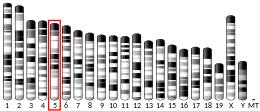| GTF3A | |||||||||||||||||||||||||||||||||||||||||||||||||||
|---|---|---|---|---|---|---|---|---|---|---|---|---|---|---|---|---|---|---|---|---|---|---|---|---|---|---|---|---|---|---|---|---|---|---|---|---|---|---|---|---|---|---|---|---|---|---|---|---|---|---|---|
| Identifiers | |||||||||||||||||||||||||||||||||||||||||||||||||||
| Aliases | GTF3A, AP2, TFIIIA, general transcription factor IIIA | ||||||||||||||||||||||||||||||||||||||||||||||||||
| External IDs | OMIM: 600860 MGI: 1913846 HomoloGene: 55630 GeneCards: GTF3A | ||||||||||||||||||||||||||||||||||||||||||||||||||
| |||||||||||||||||||||||||||||||||||||||||||||||||||
| |||||||||||||||||||||||||||||||||||||||||||||||||||
| |||||||||||||||||||||||||||||||||||||||||||||||||||
| |||||||||||||||||||||||||||||||||||||||||||||||||||
| |||||||||||||||||||||||||||||||||||||||||||||||||||
| Wikidata | |||||||||||||||||||||||||||||||||||||||||||||||||||
| |||||||||||||||||||||||||||||||||||||||||||||||||||
Transcription factor IIIA is a protein that in humans is encoded by the GTF3A gene.[5][6]
It was first purified and identified as the first mammalian gene-specific activator by Roeder in 1980,[7] and later characterized by Wolffe and Brown in 1988.
The TFIIIA in Xenopus was the first zinc finger protein discovered.[8]
References
- 1 2 3 GRCh38: Ensembl release 89: ENSG00000122034 - Ensembl, May 2017
- 1 2 3 GRCm38: Ensembl release 89: ENSMUSG00000016503 - Ensembl, May 2017
- ↑ "Human PubMed Reference:". National Center for Biotechnology Information, U.S. National Library of Medicine.
- ↑ "Mouse PubMed Reference:". National Center for Biotechnology Information, U.S. National Library of Medicine.
- ↑ Arakawa H, Nagase H, Hayashi N, Ogawa M, Nagata M, Fujiwara T, et al. (Jul 1995). "Molecular cloning, characterization, and chromosomal mapping of a novel human gene (GTF3A) that is highly homologous to Xenopus transcription factor IIIA". Cytogenetics and Cell Genetics. 70 (3–4): 235–8. doi:10.1159/000134041. PMID 7789179.
- ↑ "Entrez Gene: GTF3A general transcription factor IIIA".
- ↑ Engelke DR, Ng SY, Shastry BS, Roeder RG (Mar 1980). "Specific interaction of a purified transcription factor with an internal control region of 5S RNA genes". Cell. 19 (3): 717–28. doi:10.1016/S0092-8674(80)80048-1. PMID 6153931. S2CID 23955175.
- ↑ Bruno M, Mahgoub M, Macfarlan TS (December 2019). "The Arms Race Between KRAB-Zinc Finger Proteins and Endogenous Retroelements and Its Impact on Mammals". Annual Review of Genetics. Annual Reviews. 53 (1): 393–416. doi:10.1146/annurev-genet-112618-043717. PMID 31518518. S2CID 202572327.
Further reading
- Engelke DR, Ng SY, Shastry BS, Roeder RG (Mar 1980). "Specific interaction of a purified transcription factor with an internal control region of 5S RNA genes". Cell. 19 (3): 717–28. doi:10.1016/S0092-8674(80)80048-1. PMID 6153931. S2CID 23955175.
- Murphy JE, Keen JH (May 1992). "Recognition sites for clathrin-associated proteins AP-2 and AP-3 on clathrin triskelia". The Journal of Biological Chemistry. 267 (15): 10850–5. doi:10.1016/S0021-9258(19)50096-5. PMID 1587861.
- Seifart KH, Wang L, Waldschmidt R, Jahn D, Wingender E (January 1989). "Purification of human transcription factor IIIA and its interaction with a chemically synthesized gene encoding human 5 S rRNA". The Journal of Biological Chemistry. 264 (3): 1702–9. doi:10.1016/S0021-9258(18)94243-2. PMID 2912980.
- Drew PD, Nagle JW, Canning RD, Ozato K, Biddison WE, Becker KG (July 1995). "Cloning and expression analysis of a human cDNA homologous to Xenopus TFIIIA". Gene. 159 (2): 215–8. doi:10.1016/0378-1119(95)00145-V. PMID 7622052.
- Moorefield B, Roeder RG (August 1994). "Purification and characterization of human transcription factor IIIA". The Journal of Biological Chemistry. 269 (33): 20857–65. doi:10.1016/S0021-9258(17)31901-4. PMID 8063702.
- Fridell RA, Fischer U, Lührmann R, Meyer BE, Meinkoth JL, Malim MH, Cullen BR (April 1996). "Amphibian transcription factor IIIA proteins contain a sequence element functionally equivalent to the nuclear export signal of human immunodeficiency virus type 1 Rev". Proceedings of the National Academy of Sciences of the United States of America. 93 (7): 2936–40. Bibcode:1996PNAS...93.2936F. doi:10.1073/pnas.93.7.2936. PMC 39738. PMID 8610146.
- Oettel S, Härtel F, Kober I, Iben S, Seifart KH (June 1997). "Human transcription factors IIIC2 , IIIC1 and a novel component IIIC0 fulfil different aspects of DNA binding to various pol III genes". Nucleic Acids Research. 25 (12): 2440–7. doi:10.1093/nar/25.12.2440. PMC 146769. PMID 9171097.
- Moreland RJ, Dresser ME, Rodgers JS, Roe BA, Conaway JW, Conaway RC, Hanas JS (May 2000). "Identification of a transcription factor IIIA-interacting protein". Nucleic Acids Research. 28 (9): 1986–93. doi:10.1093/nar/28.9.1986. PMC 103300. PMID 10756201.
- Rao DS, Chang JC, Kumar PD, Mizukami I, Smithson GM, Bradley SV, et al. (November 2001). "Huntingtin interacting protein 1 Is a clathrin coat binding protein required for differentiation of late spermatogenic progenitors". Molecular and Cellular Biology. 21 (22): 7796–806. doi:10.1128/MCB.21.22.7796-7806.2001. PMC 99949. PMID 11604514.
- Hanas JS, Hocker JR, Cheng YG, Lerner MR, Brackett DJ, Lightfoot SA, et al. (January 2002). "cDNA cloning, DNA binding, and evolution of mammalian transcription factor IIIA". Gene. 282 (1–2): 43–52. doi:10.1016/S0378-1119(01)00796-X. PMID 11814676.
- Weser S, Riemann J, Seifart KH, Meissner W (May 2003). "Assembly and isolation of intermediate steps of transcription complexes formed on the human 5S rRNA gene". Nucleic Acids Research. 31 (9): 2408–16. doi:10.1093/nar/gkg345. PMC 154231. PMID 12711686.
- Pellikainen JM, Ropponen KM, Kataja VV, Kellokoski JK, Eskelinen MJ, Kosma VM (November 2004). "Expression of matrix metalloproteinase (MMP)-2 and MMP-9 in breast cancer with a special reference to activator protein-2, HER2, and prognosis". Clinical Cancer Research. 10 (22): 7621–8. doi:10.1158/1078-0432.CCR-04-1061. PMID 15569994.
- Paing MM, Johnston CA, Siderovski DP, Trejo J (April 2006). "Clathrin adaptor AP2 regulates thrombin receptor constitutive internalization and endothelial cell resensitization". Molecular and Cellular Biology. 26 (8): 3231–42. doi:10.1128/MCB.26.8.3231-3242.2006. PMC 1446942. PMID 16581796.
- Yamashita A, Takada T, Nemoto K, Yamamoto G, Torii R (July 2006). "Transient suppression of PPARgamma directed ES cells into an osteoblastic lineage". FEBS Letters. 580 (17): 4121–5. doi:10.1016/j.febslet.2006.06.057. PMID 16828750. S2CID 84554520.
- Schwartz B, Melnikova VO, Tellez C, Mourad-Zeidan A, Blehm K, Zhao YJ, et al. (June 2007). "Loss of AP-2alpha results in deregulation of E-cadherin and MMP-9 and an increase in tumorigenicity of colon cancer cells in vivo". Oncogene. 26 (28): 4049–58. doi:10.1038/sj.onc.1210193. PMID 17224907.
External links
- GTF3A+protein,+human at the U.S. National Library of Medicine Medical Subject Headings (MeSH)
This article incorporates text from the United States National Library of Medicine, which is in the public domain.
This article is issued from Wikipedia. The text is licensed under Creative Commons - Attribution - Sharealike. Additional terms may apply for the media files.



